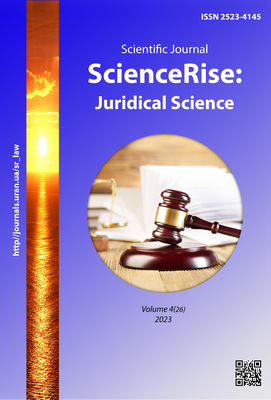On the issue of codification of urban planning legislation
DOI:
https://doi.org/10.15587/2523-4153.2023.293648Keywords:
urban planning legislation, codification, systematization, urban planning activity, construction activityAbstract
The subject matter of the article is conditioned by the discourse on the necessity to codify the urban planning legislation, approve the Ukrainian Urban Planning Code, and align its provisions with the norms of related branches of the legislation.
The purpose of the study is to specify the subject matter of the Urban Development Code's regulation and the sectoral affiliation of urban development relations, to define the structure of the codified act, and to change the requirements of the Commercial Code of Ukraine.
The research methods are based on the concepts and theories that describe the current state of the problem of the current urban planning and economic legislation in Ukraine and summarize the content of scientific works to conduct a broad analysis of the codification of the urban planning legislation while taking into account the existing legal system in Ukraine.
Results. The codification of the urban planning legislation, it is argued, provides for: increased transparency and ease of use of the norm; equivalent integrated nature of spatial planning; achievement of consistency of spatial planning and development in decision-making and regulation; decentralization and limitation of discretionary powers; and optimization of governing bodies in the urban planning sphere. The structured act of the Code will solve the problems of inconsistency and uncertainty of the conceptual apparatus in the field of urban planning, inconsistency with the land, environmental, and monument protection legislation, problems of technological support of urban planning activities, procedures for spatial planning, and public control over the development and adoption of urban planning documentation, with the maximum reduction in the number of acts of the current legislation.
Conclusions. It is proposed that the subject matter of regulation of the Urban Development Code of Ukraine should include social relations arising, changing, and terminating in connection with urban development activities based on the principles of a comfortable living environment and life cycle management of construction objects
References
- Bevzenko, V. (2023). Public Construction Law of Ukraine: From Doctrine to Practical Implementation Through European Experience. Pravo Ukrainy, 2, 33–51. doi: https://doi.org/10.33498/louu-2023-02-033
- Kolomoiets, Т., Kolpakov, В. (2023). Administrative and Legal Standards in Public Construction Law. Pravo Ukrainy, 2, 15–32. doi: https://doi.org/10.33498/louu-2023-02-015
- Maidanyk, R. A. (2019). Mistobudivne pravo: tsyvilno-pravovi aspekty. Budivelne pravo: problemy teorii i praktyky. Ch. 1. Kyiv-Ternopil: «Beskydy», 6–8. Available at: https://repositary.knuba.edu.ua/items/3827c510-2c8c-4c16-a49b-ad79437a27a2
- Kharytov, O. Ye., Kharytonova, O. I. (2018). Mistobudivne pravo u systemi yurydychnykh katehorii. Budivelne pravo: problemy teorii i praktyky. Kyiv-Ternopil: «Ekonomichna dumka», 17–22. Available at: https://repositary.knuba.edu.ua/items/628064fc-8657-4033-ab3c-b8fe46888bf4
- Chauvin, J., Pauls, J., Strobl, L. (2016). Building codes: An often overlooked determinant of health. Journal of Public Health Policy, 37 (2), 136–148. doi: https://doi.org/10.1057/jphp.2016.5
- Brouwer, F., Rademaker, B. (2017). Een nieuwe opzet van de vergunningplicht voor bouwwerken in de Omgevingswet. Tijdshrift voor Bouwrecht, 39, 218–225. Available at: https://www.hekkelman.nl/app/uploads/2019/02/5be1a41e8875f_Rademaker%20Brouwer%20Vergunningplicht.pdf Last accessed: 18.08.2023
- Behandeling Wet kwaliteitsborging voor het bouwen (2017). Available at: https://www.eerstekamer.nl/verslagdeel/20170704/wet_kwaliteitsborging_voor_het Last accessed: 18.08.2023
- Fenyőházi, A., Szabó, Z. (2021). Government Decree No. 312/2012 Modified Again. Available at: https://constructionpapers.hu/en/construction/government-decree-no-312-2012-modified-again/ Accessed 18 Aug. 2023.
- Ozge, C. Y., Ertekin, O. (2023). Urban Living labs as a tool to achieve sustainable development goal 16: a case study of Istanbul, Turkiye. Theoretical and Empirical Researches in Urban Management, 18 (3), 88–118. Available at: https://www.jstor.org/stable/27232316 Last accessed: 18.08.2023
- Kvasntska, O. I. (2013). Synergy publcly-legal and prvately-legal frameworks of buldng actvty s a basc way of development of the economc system of Ukrane. Naukovi pratsi natsionalnoho universytetu «Odeska yurydychna akademiia», 13, 508–519. Available at: http://dspace.onua.edu.ua/handle/11300/5311?locale-attribute=uk
- Bazov, V. P. (2021). Zahalna kharakterystyka kodyfikatsiinoho dosvidu krain romano-hermanskoi systemy prava. Novitni oriientyry kodyfikatsiinoi diialnosti. Kyiv: Vyd-vo «Liudmyla», 36.
Downloads
Published
How to Cite
Issue
Section
License
Copyright (c) 2023 Olga Kvasnitska

This work is licensed under a Creative Commons Attribution 4.0 International License.
Our journal abides by the Creative Commons CC BY copyright rights and permissions for open access journals.
Authors, who are published in this journal, agree to the following conditions:
1. The authors reserve the right to authorship of the work and pass the first publication right of this work to the journal under the terms of a Creative Commons CC BY, which allows others to freely distribute the published research with the obligatory reference to the authors of the original work and the first publication of the work in this journal.
2. The authors have the right to conclude separate supplement agreements that relate to non-exclusive work distribution in the form in which it has been published by the journal (for example, to upload the work to the online storage of the journal or publish it as part of a monograph), provided that the reference to the first publication of the work in this journal is included.








